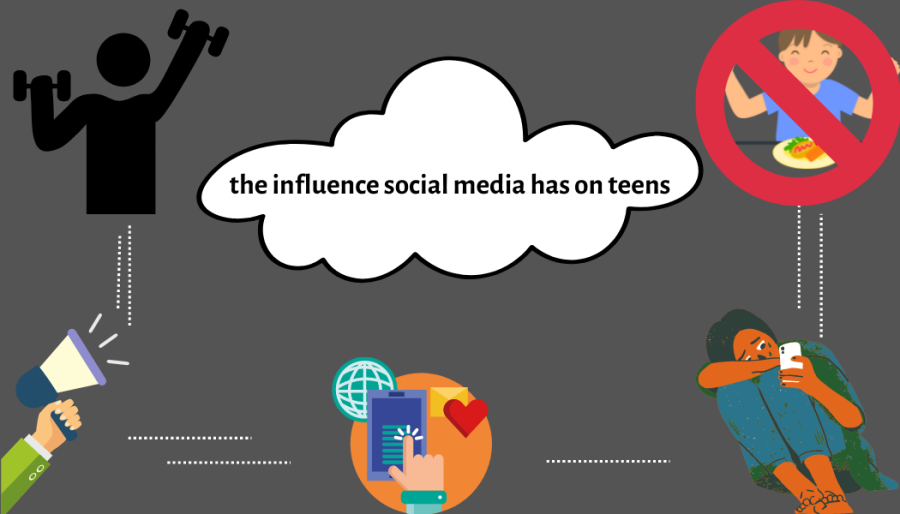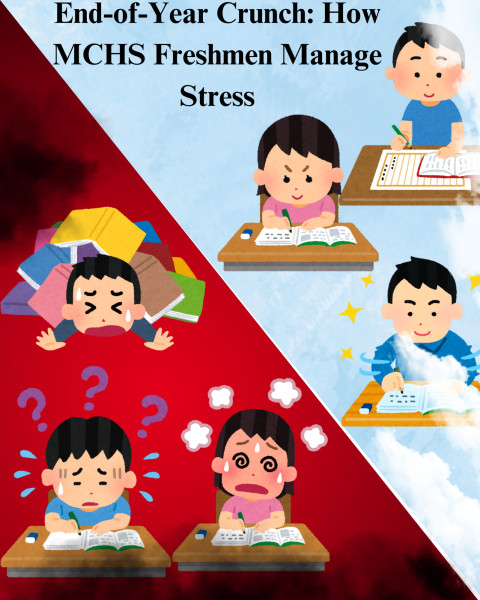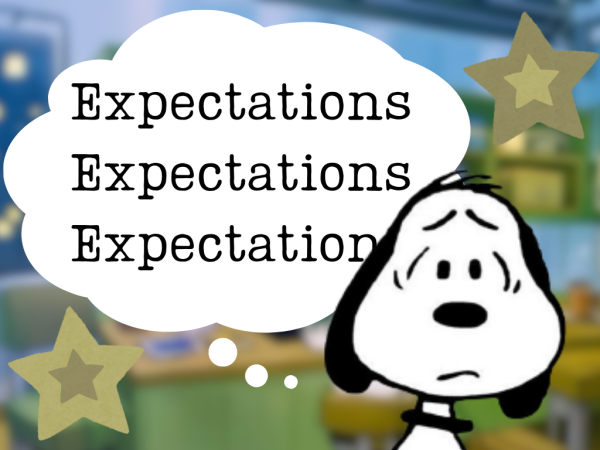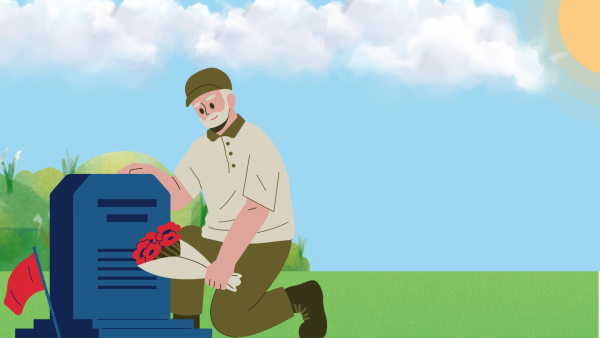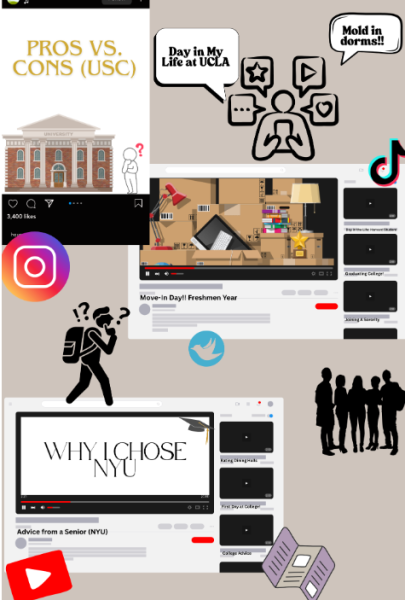The influence social media has on teens
Malena Fouts-Arteaga made with Canva
Teenagers are already self conscious about their bodies, but social media influencers make the issue worse, as 45% of teens feel overwhelmed from social media drama.
If you’re active on social media, it is inevitable that you will run into someone saying something negative about anything. Some people ignore it and continue scrolling, but what about the rest of us? Do people really let something that some stranger said on social media get to them? Surprisingly, yes. These negative comments do affect people. It turns out that 58% of Americans feel like social media negatively affects their mental health.
Students at MCHS took a survey about the negative effects of social media. Out of all the respondents, 71% are sophomores, 14% are freshmen, and the remaining 15% are juniors.
When asked if they have ever felt anxious about sharing their online opinions, 100% responded that they have felt anxious.
57% said they felt as if people care too much about other’s opinions, 42% said “maybe.”
85% of respondents said that they feel like people on social media have successfully made other people feel bad, 15% said “maybe.”
“People don’t really think about what they are going to say. Like if it’s going to hurt the other person’s feelings, they just don’t think your opinion is right,” said one anonymous student.
Many people have lost their filter, especially with the anonymity that comes with being online. Some people just started saying whatever they wanted, without thinking about the possible consequences that might come after posting something offensive. Of course, everyone is allowed to think that their own opinion is correct, but there’s a difference between just believing what you think is right and listening to others, and refusing to listen to anyone else, because you think that you’re the only one who’s right.
Another anonymous student said, “If they’re wrong it’ll make them feel terrible. Therefore, they attack others’ opinions first.”
Nobody likes realizing that they were in the wrong; people like to think that they’re always right. If you attack everyone who disagrees, then eventually there won’t be anyone to oppose what you say, so you can’t be in the wrong.
Many students seem to have the same idea; people put others down because they’re too scared to be put down first. According to ditchthelabel.org, people attack others because of the power dynamic that is created. In some cases, this may be a trauma response, so they use aggression to “mask” what happened to them. The attacker has the control in the situation, and the victim may be too scared to do anything about their problem because they don’t want to face the “consequences” of confronting their attacker.
Not only can social media influence the way that someone dresses, but it also has a big political influence on people, too. According to pewresearch.org, 72% of Americans believe that politicians have “too much power and influence” on social media. During the last presidential election, Twitter expanded their use of warning labels in order to stop the spread of election misinformation. They hid content that could potentially be fake claims coming from or about politicians and didn’t allow the tweets with the warning label to be recommended on their algorithm.
Fake news or misinformation is used to gain more credibility; so if someone keeps gaining a bigger audience from spreading fake news, they’ll be able to influence and control more people. This becomes a problem because teens are becoming more politically-aware and involved at a time when people are able to post or share anything without consequences.
Social media also plays a big role in changing the way teens see themselves. Back in the early 2010s, people took to apps like Tumblr to spread eating-disorder-inducing content. This included pictures of thin bodies, drugs that have made people lost weight, and quotes or “motivation” that make people rethink their eating habits. They also told people that they must have a certain body type in order to dress in certain styles, and that people who embraced their true bodies were posers and didn’t belong in the subcultures. This went on from the beginning of Tumblr to about 2015. Just when people thought it was over, the “pro-ana” trend was brought over to TikTok, which is widely used by young, easily impressionable people. Now on the app, you can find people sharing their insanely low weight, barely nutritional “meals’’or diets, and people putting down celebrities, especially k-pop idols for being “overweight.”
When we’re teens, we begin to explore our interests and are able to better express ourselves as we’re able to afford to buy our own things, such as clothes. Constantly, new trends and microtrends are brought up on social media and are praised, but when they die off, people that still participate are usually made fun of. It happens countless times, and it’s hard to either keep up or dress in a way that makes you happy. If you post your “basic” outfits, people will come at you for having no style. But if you post a picture of yourself wearing something that is less widely-known, such as a foreign or alternative style, people will come at you for trying to hard to please others. If you delete the post, people will come after you for being scared or insecure. But if you keep it up and defend yourself, people will come at you for being overly confident or for trying too hard to be different.
While it’s hard to ignore other people and be the person who you want to be, it’s important to recognize that there really are people like you out there. Being ashamed of who you are or trying to be someone you’re not is harmful to not only yourself, but the people around you.
It’s okay to let go, or unfollow, people who post content of things that make you upset or things that you don’t like anymore. It’s the key to being happy, surround yourself with the people you enjoy and share interests with, and let go of the people you make you feel uncomfortable or confused. Social media has created safe spaces for oppressed communities by giving them the ability to express themselves anonymously. There will always be a community of people that will be there for you, you just have to find them. So the next time someone has you rethinking who you are, remember that they’re no better than you; being yourself and being happy is the most important thing to remember.
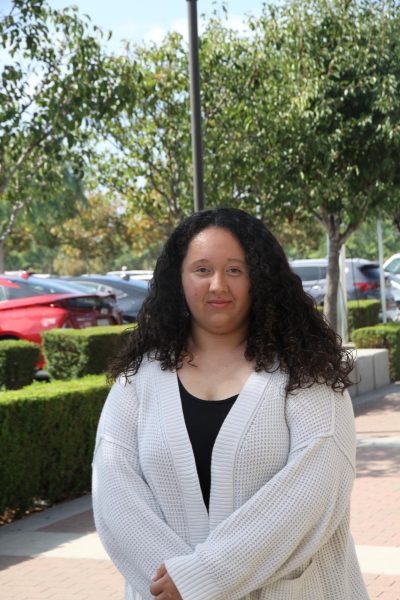
I love buying clothes for my dog, my favorite band is Lamp, and my favorite animal is the whale shark.
































